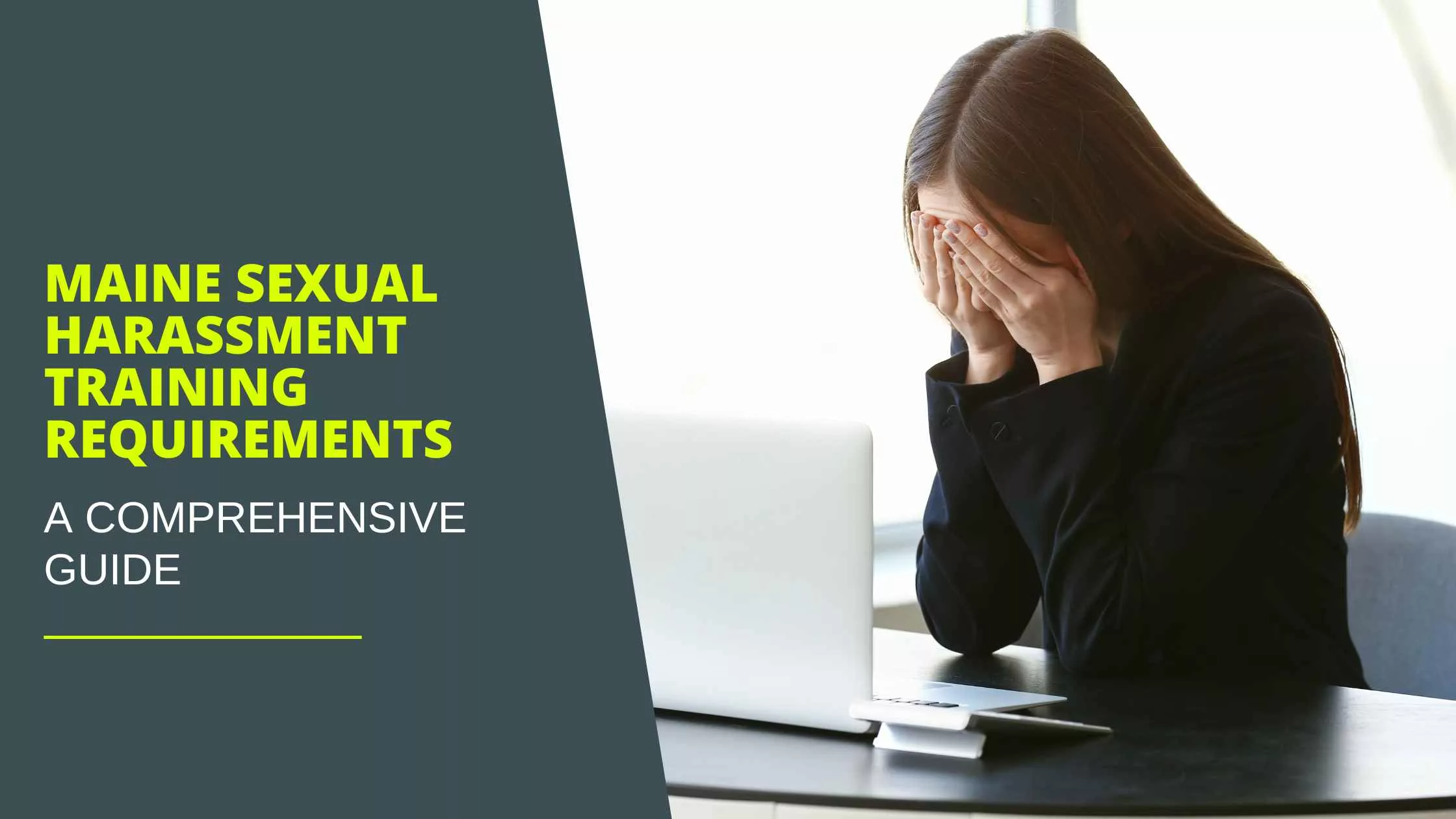Harassment in the workplace affects the working environment as the victim of the situation. However, this can be avoided by completing sexual harassment prevention training requirements.
Like many other states, Maine officially mandates that companies train staff members in sexual harassment prevention to guarantee a safe, polite, and efficient workplace. This training is dependent on legal compliance and a good company culture.
Hence, the Maine sexual harassment training requirements—including the legal frameworks, particular training materials, delivery strategies, and employer responsibilities—will be discussed in this.
Understanding these needs will help companies and staff members collaborate to establish a harassment-free workplace that encourages fairness, respect, and inclusion for all.
Legal Framework
Title 26, Section 807 of the Maine Revised Statutes (1991)
In Maine, the harassment training requirements are outlined in Title 26, Section 807 of the Maine Revised Statutes.
This legislation mandates that companies with 15 or more workers provide their personnel with Maine harassment training. This regulation applies to all Maine businesses, regardless of their sector or line of business.
Maine Harassment Training Must Be Provided Within One Year Of Hire
Employers must offer their staff harassment prevention training within one year of their employment date. This guarantees that new employees are instantly aware of corporate policies and the need to preserve a friendly workplace.
Sexual harassment prevention training must be provided as part of a continuous process to inform staff members about suitable behavior and conduct in the workplace that can qualify as harassment.
Federal Laws Applicable
Apart from rules exclusive to states, several federal statutes restrict sexual harassment in the workplace. Designed to protect employees from harassment and discrimination in the workplace, these laws set the foundation for preventing harassment.
Civil Rights Act of 1964, Title VII
Among the most important federal laws limiting sexual harassment is Title VII of the Civil Rights Act of 1964, which outlaws discrimination and harassment predicated on race, color, religion, sex, and national origin.
The harassment prevention training has its roots in this law. Companies with 15 or more employees must respond promptly and responsibly to any harassment claims, according to Title VII.
The Americans with Disabilities Act (ADA) assures workers with disabilities are not mistreated because of their condition, is another relevant federal statute.
In addition, the Age Discrimination in Employment Act (ADEA) protects employees over 40 from age-based harassment.
Training Content For The Sexual Harassment Prevention Training
The law mandates that Maine sexual harassment training should cover several key topics within its guidelines. This guarantees that every employee has the information to spot and handle harassment.
Definition of Sexual Harassment
Sexual harassment is any improper sexual behavior that makes the workplace unpleasant or threatening.
It covers quid pro quo harassment—that is, when job decisions are based on sexual advances. Moreover, it also highlights a hostile work environment harassment. That is, when actions or words generate a disruptive, uncomfortable, or dangerous workplace.
Illegality of Sexual Harassment Under the Maine Human Rights Act and Federal Laws
Federal law and the Maine Human Rights Act, forbid sexual harassment.
The Maine sexual harassment training must highlight the legal consequences of engaging in or supporting harassment. Companies have to make sure every staff member understands harassment is unlawful and immoral.
Examples of Behaviors That Constitute Harassment
Well-written training materials will highlight explicit instances of behaviors that may constitute harassment. These may encompass:
- Verbal harassment: Derogatory jokes, statements regarding an individual’s looks, or unwanted sexual comments.
- Physical harassment: Uninvited contact, grabbing, or obstructing an individual’s movement.
- Visual harassment: Exhibiting sexually graphic imagery or engaging in lascivious gestures.
Procedures for Reporting Harassment
The harassment prevention training must outline the procedures employees should follow if they encounter or observe harassment. Employees must know the appropriate channels for reporting occurrences and the procedures that safeguard their rights.
Harassment training for Maine must underscore the need for confidentiality and safeguards against retaliation.
Employer Responsibilities and Employee Rights
Once harassment accusations come in, companies have to act quickly and forcefully. Workers have the right to work in an environment free of harassment and discrimination.
Training must ensure staff members understand their rights and responsibilities in keeping a polite workplace.
How to Train Your Employees
Implementing employee harassment training in Maine necessitates careful planning and effective execution to guarantee its engagement and efficacy. Employers in Maine possess multiple methods for providing this training.
Methods of Delivering Employee Harassment Training Maine
In-Person Training
Face-to-face training is among the most efficacious approaches to imparting sexual harassment education.
It facilitates direct engagement with staff, promoting dialogue and the chance to pose inquiries. Live training can be customized to meet a workplace’s particular training requirements, providing practical examples and addressing specific challenges that may occur inside the organization.
Online Courses
Online courses are an optimal alternative for firms with remote employees or multiple locations. These courses may be undertaken at the employee’s discretion, providing flexibility while comprehensively addressing all requisite subjects.
Online Maine employee harassment training sessions generally incorporate quizzes and interactive elements to improve participation and understanding.
Customizable Training Options
Employers may also select personalized training solutions like Coggno, which provides specialized sexual harassment prevention training tailored to the employer’s requirements.
These tailored programs can address the specific difficulties of a certain business, guaranteeing that the Maine anti-harassment training is pertinent and applicable.
Introduction to Maine Harassment Discrimination
Harassment Discrimination – Maine Scenarios
Maine Sexual Harassment Training for Managers and Supervisors
Maine Sexual Harassment Training for Employees Course
Annual Written Notifications to Employees
Along with the initial training, Maine businesses must provide yearly written notices to staff members on sexual harassment policies. This assures staff members of the company’s stance on harassment and the reporting procedures.
Posting of Sexual Harassment Policies in the Workplace
Companies must display their policies on sexual harassment in the workplace to ensure that every staff member is aware of their expectations.
This is a constant reminder of the need to keep a civil environment.
Handling Complaints and Investigations
When an employee claims harassment, companies ought to react immediately and appropriately. This calls for well-defined policies for addressing grievances and conducting inquiries.
Steps to Take When a Complaint is Received
When a harassment complaint is received, the employer must:
- Listen carefully to the complaint to understand the details.
- Document the complaint and all steps taken.
- Take immediate action to ensure the situation does not escalate, such as separating the parties involved.
- Investigate thoroughly to understand the nature of the complaint and determine if harassment occurred.
Importance of Documentation and Confidentiality
Every action done during a probe has to be meticulously recorded.
Maintaining the privacy of all involved depends on confidentiality, which also guarantees fairness throughout the procedure. Documentation reduces legal risks and offers a record should further action be required.
Role of HR in Addressing Complaints
The Human Resources (HR) division mainly handles harassment claims. HR experts conduct objective investigations and ensure the accused and the complainant have an opportunity to present their side of the story.
They also have to ensure the individual who claimed nothing suffers any reprisals.
Legal Protections Against Retaliation
Retaliation directed against staff members who report harassment is forbidden.
Maine companies must ensure that staff members who raise harassment issues are not negatively treated. Training should support an open culture and confirm the legal defenses against reprisals.
Preventive Measures
Preventing harassment is just as crucial as handling it when it does happen. Companies should concentrate on building a good working environment that discourages improper behavior and advances respect among their staff members.
Creating a Positive Workplace Culture
A positive workplace is defined by an inclusive, respectful, and varied environment. Companies should aggressively strive to establish a culture whereby harassment is unacceptable. This way, staff members feel confident reporting any problems they encounter.
Encouraging Open Communication and Respect Among Employees
Encouragement of honest lines of contact between management and staff helps to resolve problems before they become more serious. Workers should be at ease raising issues without worrying about reprisals.
Regular Review and Updates of Harassment Policies
Policies regarding harassment shouldn’t be set in stone. Companies have to routinely check and update these rules to ensure they remain pertinent and successful. This covers any legal modifications as well as staff comments guiding adjustments.
Conclusion
Following harassment prevention training is not only a legal obligation but also a necessary component of fostering a polite and efficient workplace.
Employers must follow federal and state rules, fulfill the legal requirements for harassment prevention, and ensure that their staff members know their rights and obligations.
Businesses can establish a workplace free from harassment and discrimination by providing thorough training, encouraging honest communication, and actively resolving harassment complaints.
Employers and staff members can collaborate by fulfilling Maine sexual harassment training requirements to stop harassment and advance a culture of professionalism and respect.
Choose Coggno’s flexible and engaging online courses to ensure your team is trained, certified, and equipped to maintain a respectful, harassment-free workplace. Start your training today and build a better workplace!


















